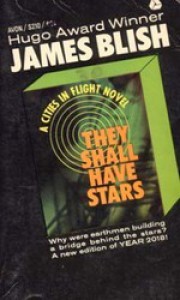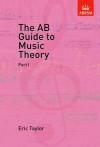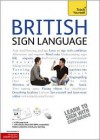Currently reading
The Blinding Knife
Logic: An Introduction to Elementary Logic
First Steps In Music Theory
The AB Guide to Music Theory: Part I
The Last Man
Fast Ships, Black Sails
British Sign Language
Being a Quaker
Shadow Unit 2
They Shall Have Stars
 I'm currently reading through the omnibus Cities in Flight, which contains all four books in Blish's series. But I couldn't contain myself to one review for the omnibus, each book deserves its own personal review, so hopefully I may be forgiven for shelving all four books and the omnibus. It's not done to drive up my 2012 book challenge, honest!
I'm currently reading through the omnibus Cities in Flight, which contains all four books in Blish's series. But I couldn't contain myself to one review for the omnibus, each book deserves its own personal review, so hopefully I may be forgiven for shelving all four books and the omnibus. It's not done to drive up my 2012 book challenge, honest!'They Shall Have Stars' was slightly difficult to get into, not only is the style of writing slightly different to the modern sci-fi and fantasy that I'm more used to. But the method is quite original, and reminds me in hindsight now of George R.R. Martin's method in the Song of Ice and Fire novels. The story is told from 3 different 3rd person points of view, which change each chapter.
In the first setting, we are in Washington, watching the character Senator Bliss Wagoner, who is making some very hard decisions. Scientifically, humanity is in a bit of a rut. No new advances have been made for decades, and humanity is no closer to interstellar travel than it was 50 years ago. The West is still pitted against Russia in what seems to be a war of science and ideas. But everything in the west is so mired in 'top secret' bigbrotherness, that no ideas can be shared and no progress is ever made. Wagoner is determined that new breakthoughs must be made, and turns to his friend Giuseppi Corsi for advice. Corsi advises Wagoner to seek innovation through ideas that have already been dismissed untried, where scientists have been labeled as crazy and ignored. And thus Wagoner's new science initiative is born, but whatever price is paid by humanity to carry out these crackpot experiments, the whole of it rests on Wagoner's shoulders.
In New York, Colonel Paige Russel of the Army Space Corps is dropping off soil samples collected on Jupiter V, at the Pfitzner Plant for analasis. Paige finds himself curious about why the soil samples are needed and manages to get himself a personal tour of the laboratory, during which he hears the cries of newborn babys. He refuses to believe the lies then told him about this, and becomes concerned about the real reason why babies might be involved in laboratory research. He hopes to gain some answers by going on a date with the secretary Anne, who knows more than a secretary normally would. But unwittingly he stumbles head over heels in love with Anne, and finds himself suddenly personally involved in the morally dubious research for the secret of anti-aging drugs.
And on Jupiter V, a moon of Jupiter, Bob Helmuth is one of a team of personal working on a Top Secret project. Remotely, through a virtual reality medium, Helmuth controls machines which are building an inhumanly large 'bridge' of ice above the surface of Jupiter. Helmuth and the other workers have been mentally conditioned into believing that the bridge is the most important thing to them, to ensure completion of the project even through the unbearable conditions they must put themselves. The bridge on Jupiter is a massive undertaking, but the goal and purpose of it is unknown even to the workers, but Helmuth has his own theories. He believes that the bridge may be part of an experiment to produce anti-gravity technology.
They Shall Have Stars was a great beginning to the quadrilogy. Whilst the unusual setup made it slightly slow to get into, once I was in I was completely hooked by the various mysteries going on.
I found Wagoner to be a particularly hard character to read. He has a determination to keep the civilisation of the West marching forward, but he doesn't seem to care what price they have to pay to get there. He is responsible for some quite horrific tragedies through ordering these experiments, and yet I'm not sure he shows much remorse for it. Yes he questions it, but obviously he sticks with the choice he made, and I'm not sure that I felt a great deal of emotion from him about it. I could just be missing it due to my unfamiliarity with the writing style, but I just wasn't completely happy with his character. Other reviewers have stated that Wagoner was intended to be a christ figure, but I can't say I saw that at all. Christ was willing to be sacrificed yes, and he knew that his disciples would suffer for him also, but he gave them that choice. Wagoner never gave a choice to the people he used. I could go into more detail, but I'd be risking spoilers, and probably getting into a big rant, and everyone hates rants. So I'll just leave that topic with this - if Blish did intend Wagoner to be a christ figure then he's lost a bit of my respect for that, I'd much prefer that Wagoner remain a driven but fallible man, the story works much better that way.
The character than I most felt the most sympathy for was Robert Helmuth, the bridge worker. His sections invoked real feelings of awe for the huge scope of the bridge project and for the storm-wracked alien landscape of Jupiter itself. But also the strange combination of frustration and fear from his unusual situation. Bob is to all intents on puposes trapped on the little moon base, with his fellow workers who are all conditioned mentally to revere the bridge. And yet Bob is having nightmares about the bridge, and seems more depressed by it all than in love with it. It's almost like being inside a fanatical cult, but one sanctioned by your own goverment, and one trapped on a far away asteroid with no real way off. These parts were (for me) probably the best written, and the most evocative of the whole book.
One minor thing that also bothered me in this novel, was a repeated error in the mathematical notation. Blish was quite cool by using actual mathematical formulas, which despite the age of the novel still gave an interesting and somewhat believable base for his science fiction. But there was a small error in the notation that irritated the hell out of me. In the main formula used, instead of being written 'G^(1/2)' (which also can be written as the square root of G) the notation 'G 1/2' was used (which is not the same at all), and which ruined the derivation of the next formula completely. I probably sound like I'm up my own ass, but mathematical and scientific errors can be as off-putting to me as grammatical and spelling errors are to other readers. It's a shame how a minor error can spoil things, but it happens.
On the whole tho, I thought They Shall Have Stars was a great start to the series, and I'm realling interested to see where things go from here. Onto the next book!
See my other reviews of Cities in Flight:
| #2 A Life for the Stars →











